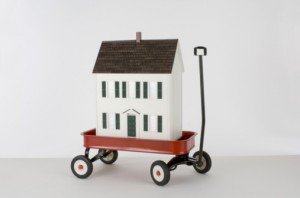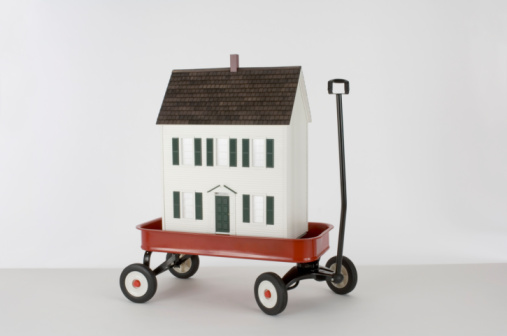Families are at risk of spiralling into debt due to the unexpected costs of moving into and maintaining their homes, according to a new report. Home Economics, a report by national charity Family Action and Lloyds Banking Group’s Money for Life Programme, reveals that some families would consider cutting back on heating and food costs […]
Families are at risk of spiralling into debt due to the unexpected costs of moving into and maintaining their homes, according to a new report.
 Home Economics, a report by national charity Family Action and Lloyds Banking Group’s Money for Life Programme, reveals that some families would consider cutting back on heating and food costs or going into credit card debt to furnish their homes.
Home Economics, a report by national charity Family Action and Lloyds Banking Group’s Money for Life Programme, reveals that some families would consider cutting back on heating and food costs or going into credit card debt to furnish their homes.
Meanwhile, others are not spending any money at all on keeping their homes in good condition, and some of the UK’s most vulnerable families are struggling to afford essential items such as fridges and even beds.
When it comes to the costly business of moving house, a quarter of Brits (25 per cent) said that removal costs came as a financial shock, according to a YouGov survey of 2,338 adults. Almost a quarter (23 per cent) said they were unprepared for the costs of buying new furniture, while 23 per cent considered the cost of essential household items, such as fridges, washing machines and cookers, to be surprisingly expensive.
To pay for the cost of furnishing a new home, almost a third (29 per cent) of Britons would consider going without new clothes, 17 per cent would cut back on food spending and 13 per cent would cut back on heating. Meanwhile, half of Brits polled said they would sacrifice a holiday so they could afford to furnish their new home.
The poll found that a quarter (25 per cent) of young cash-strapped Brits (aged 23-34) admitted that when faced with the financial stress of furnishing a new home, they would consider using a credit card. Others admitted to borrowing from family and friends and using rent-to-own shops, which can charge high interest rates and can result in families paying far more than the cost of the original item had they bought it outright.
Millions of Britons also admit struggling to keep their homes in good condition. In fact, in spite of the perceived home improvement boom, almost 60 per cent of Brits claim the state of their homes had either worsened or stayed the same over the past five years, with one in 12 saying that they spent nothing at all on maintenance or household items over the past year.
Nevertheless, many Britons are still house-proud and the pressure to keep up with the Joneses remains, with 38 per cent saying they would be embarrassed if guests spotted an essential household item was broken.
Even when people do spend money on their home, many do so without the means to pay for it. Nearly a third (32 per cent) of 24-35 year olds – and 21 per cent of all British adults – feel they could not actually afford what they had spent on the general upkeep of their home in the last year.
In an interview for the report, a Family Action service user and mother of two told how she was forced to endure several months in temporary accommodation with a serious damp problem and broken household essentials. The cooker was faulty, the washing machine didn’t work, the boiler broke down and she couldn’t afford to fix or replace the items.
Sarah Porretta, Head of Lloyds Banking Group’s Money for Life programme, said: “As this report shows, for many families across Britain money management is an increasingly vital life skill with families today facing all sorts of unexpected financial pressures. Money for Life’s partnership with Family Action is designed to look into the issues facing many British families and support and help them to develop the knowledge and confidence to manage their money well – in this case helping families to prepare for the unforeseen pressures of moving home and maintaining it. We are working with Family Action to deliver free, face-to-face workshops to low income and disadvantaged households around the country, and our employees are committed to helping families with issues that affect their daily lives.”
Family Action, which provides services to disadvantaged families and runs a network of children’s centres across the country, has linked up with Lloyds Banking Group’s Money for Life Programme to give families a number of tips for saving money at home.
- Before you move into your new home, ask the current home owner or tenant if they are interested in giving you or selling you any of their white goods or soft furnishings. Sometimes items will not fit into their new property and they may give you a good deal on them. This way you can save money not only on the items themselves but also on delivery and installation costs.
- Be willing to accept second hand or third hand items from friends and family. Why not have a clear out yourself and give them items that you don’t want anymore. In turn, you could receive things that you need with no expense whatsoever.
- Car boot sales, charity shops and antique shops are great places to find quality household bargains and pick up affordable furniture you can spruce up. A new coat of paint or varnish is cheap and easy to do and will give your furniture a new lease of life.
- Shopping websites such as eBay offer the opportunity to find good bargains on furniture and many allow you to buy and sell any unwanted items that you might have lying around.
- Use online networks such as Freecycle (www.freecycle.org) to pick up free household items.
- Buying an energy efficient appliance can save a lot of money in the long term. An energy efficient fridge-freezer can save up to £45 a year on energy bills.
- Only buy the bare essentials when you first move into a new home as it is easy to get carried away and buy things that you don’t need, regretting it later on. See if family and friends can lend you basic items until you can decide what you really want and need.
- Try buying things out of season. For example, if you were to buy garden furniture in the autumn, companies are likely to put their leftover summer stock on sale (savings can be over 50%) to create space for new stock. You can then store it safely for next year.
- Removal costs can come as a big surprise. Get multiple price quotes from removal firms in your area to find the best deal. It’s also a good idea to visit your local supermarket and ask for free boxes and pack as much as you can yourself as removal firms usually charge extra for packing materials.
- If money’s tight and you worry about getting into debt, don’t be afraid to ask for advice. Try your local Citizens Advice Bureau, or call the Money Advice Service’s helpline – 0300 500 5000. Or try Lloyds Banking Group’s www.moneyforlifeprogramme.org.uk for more hints and tips.














